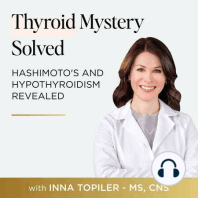30 min listen

156 Hyperthyroidism or Hypothyroidism? Reasons for Fluctuating TSH with Dr. Eric Osansky
FromThyroid Mystery Solved: Hashimoto's and Hypothyroidism Revealed
156 Hyperthyroidism or Hypothyroidism? Reasons for Fluctuating TSH with Dr. Eric Osansky
FromThyroid Mystery Solved: Hashimoto's and Hypothyroidism Revealed
ratings:
Length:
42 minutes
Released:
Nov 9, 2023
Format:
Podcast episode
Description
Shortcut to my thyroid program. The Case: Lucy was experiencing symptoms that went back and forth She would experience heart palpitations, hot flashes, and anxiety and then she’d have periods of fatigue Her doctor suspected hyperthyroidism and tested her for Graves I knew that there was reason to investigate further because her symptoms weren’t adding up. When it comes to hyperthyroidism, there’s one person I often turn to - Dr. Eric Osansky, a chiropractor and host of the ‘Save My Thyroid’ podcast. His interest in hyperthyroidism comes from his personal Graves diagnosis in 2008. He is also the author of 2 thyroid books, ‘Natural Solutions for Hypothyroidism and Graves’ Disease’ and ‘Hashimoto’s Triggers: Eliminate Your Thyroid Symptoms by Finding and Removing Your Triggers’ On this show, we talk a lot about hypothyroidism and how Hashimoto’s can be at play. Many don’t think that Hashimoto’s can also be present when someone has an overactive thyroid (Hyperthyroidism and sometimes Graves’ Disease). It all starts by looking at and understanding TSH levels. Reviewing the Basics of Thyroid-Stimulating Hormone (TSH) The thyroid gland is a critical component of our endocrine system, responsible for regulating our metabolism. When it comes to thyroid assessments, most practitioners start by examining the Thyroid-Stimulating Hormone (TSH). Dr. Osansky explained that TSH stands for "Thyroid Stimulation-Communicating Hormone" and is produced by the pituitary gland. This hormone plays a vital role in communicating with the thyroid and serves as a fundamental element of many thyroid evaluations. When it comes to hypothyroidism, including conditions like Hashimoto's, you'll often see elevated TSH levels. This is because the thyroid hormone in the body is on the lower side. It might be just within the lab's reference range, or it could be overtly low. In response, the pituitary gland sends a clear signal to the thyroid: "We need more thyroid hormone!" This signal takes the form of an increased TSH level, prompting the thyroid gland to produce more thyroid hormone. Conversely, in the case of hyperthyroidism, it's the complete opposite. With hyperthyroidism, there's an excess of thyroid hormone circulating in the bloodstream, mainly bound to proteins. In this scenario, the pituitary gland signals the thyroid to slow down production. As a result, you'll commonly observe not only low TSH but sometimes an undetectable TSH, especially in conditions like Graves' disease. This undetectable TSH indicates that the pituitary is working hard to halt the overproduction of thyroid hormone. So, while TSH levels can provide valuable insights, they're just one piece of the puzzle. We need to dig deeper into the thyroid hormones to get the full picture. Comprehensive Thyroid Testing is Always Key According to Dr. Eric, to reach a proper diagnosis, we must also examine the thyroid hormones, particularly free T3 and free T4. These free hormones offer a more accurate representation of thyroid function. In hyperthyroidism, where the thyroid hormones are typically elevated, examining free T3 and free T4 alone is often sufficient because total hormones will also be elevated. On the other hand, in hypothyroidism, some practitioners prefer to assess not only free hormones but also total hormones to gauge production since a significant portion of thyroid hormone is bound to proteins. Let's not forget reverse T3, an inactive form of T3. It's a bit of a controversial character in the thyroid world. Some suggest that reverse T3 may act as a blocking agent, especially in hyperthyroidism. Elevated reverse T3 levels are common in this condition, further hinting at its role in dampening excessive thyroid hormone activity. But the thyroid's complexity doesn't end here. We also need to consider antibodies, which play a crucial role in autoimmune thyroid conditions like Hashimoto's. Plus, keep in mind that it's not just the thyroid at play; the pituitary gland cou
Released:
Nov 9, 2023
Format:
Podcast episode
Titles in the series (100)
005 The Case of the Soul-Crushing Insomnia w/ Emily Fletcher: When Melatonin and Antidepressants were no Match for a Racing Mind and Sleepless Nights We Had to Address the Stress by Thyroid Mystery Solved: Hashimoto's and Hypothyroidism Revealed